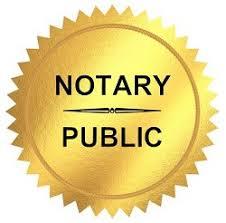Notary Public: Your Trusted Witness and Paper Authenticator
Notary Public: Your Trusted Witness and Paper Authenticator
Blog Article
Demystifying Notarial Work: Simplifying the Function and Importance of Notaries
Their role, frequently shrouded in secret for lots of, brings considerable weight in ensuring the validity and integrity of important files. By unwinding the complexities losing and surrounding notarial techniques light on the value of their acts, a more clear understanding emerges of the essential duty notaries play in maintaining the textile of legal and lawful arrangements.
The Background of Notarial Job
How did notarial job advance with time to become an integral part of lawful and company purchases? The background of notarial work dates back to ancient civilizations, where scribes played a crucial function in taping crucial info and confirming papers. As cultures proceeded, the demand for a more formalized system to make certain the legitimacy of arrangements developed. This resulted in the advancement of notaries, people assigned by the state to function as unbiased witnesses in lawful matters.
During the Middle Ages, notaries gained prominence in Europe, with their functions expanding to include drafting legal records, licensing signatures, and maintaining records. The increase of global profession further highlighted the importance of notarial job in confirming contracts and contracts throughout boundaries.
In the modern-day era, notaries remain to play a vital duty in legal and organization transactions by confirming identities, confirming the authenticity of papers, and protecting against scams. Their duty in certifying the legitimacy of contracts includes a layer of security and depend the ever-evolving landscape of commerce and regulation.

Duties and Duties of Notaries
Notaries play a crucial duty in confirming the credibility of documents and the identification of signatories. One of their key responsibilities is to witness the signing of crucial documents, such as agreements, deeds, and wills, to guarantee that all events are getting in into contracts purposefully and voluntarily.
They accredit copies of initial records, offering guarantee to institutions that the copies are true replicas of the originals. On the whole, the obligations and responsibilities of notaries are necessary in safeguarding the honesty and legality of various files and transactions - Conveyancer.
Notarial Certificates and Signatures
Exemplifying precise attention to detail, notarial certifications and trademarks function as vital parts in verifying the authenticity of lawful records. Notarial certifications typically contain critical details such as the day of notarization, the names of the signatures, a summary of the file, and the notary's official seal. These certifications give a clear document of the notarial act, making sure that the paper can be conveniently recognized and click here to read traced back to the notary that looked after the process.
Trademarks play a critical duty in notarial job, as they indicate the arrangement and approval of the celebrations involved. Notaries very carefully witness the signing of documents to validate the identity of the signatories and confirm that they are signing of their own free choice. By affixing their official seal and trademark to the record, notaries accredit that the needed procedures have been followed and that the file is enforceable and legitimate.
In essence, notarial certifications and trademarks are the characteristic of authenticity in lawful deals, providing guarantee to all events entailed that the files are legit and binding.
Significance of Notarial Acts

Registration Process Described
The notarization process usually begins with the specific offering the record to a notary public. As soon as the identification is validated, the notary guarantees that the specific authorizing the document does so voluntarily and without any threat.

Conclusion
:max_bytes(150000):strip_icc()/GettyImages-598314157-cb6389c9e28f4c1aaf002263febab019.jpg)
Notarial certificates usually consist of important info such as the date of registration, the names of the signatures, a summary of the file, and the notary's official seal. These certifications give a clear document of the notarial act, you can look here ensuring that the record can be easily recognized and mapped back to the notary who looked after the procedure.
By affixing their official seal and signature to the paper, notaries license that the required treatments have been complied with and that the file is enforceable and valid.
By validating the identity of the notaries, verifying their willingness to enter into the agreement, and certifying the date and area of the finalizing, notaries play an important duty in supporting the legitimacy of lawful papers.After the record is signed, the notary will affix their main seal or stamp onto the paper.
Report this page